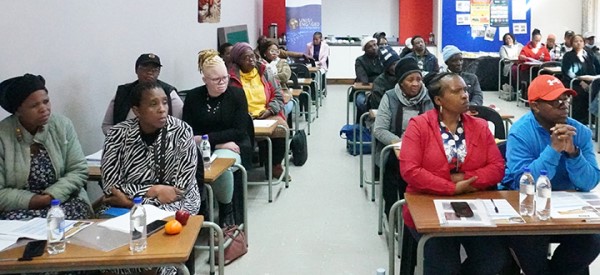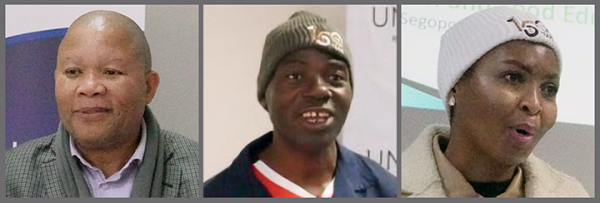News & Media
Chance 2 Advance deepens business and food security skills
Subsistence farming involves a subsistence farmer, family or group who grow only enough to feed themselves. This type of farming seeks to provide just enough produce for the household of the farmer. Any surplus produce is then available to the farmer to contribute to the community or to trade.
Unfortunately, scholars have noted that subsistence farmers in rural communities experience challenges relating to rural infrastructure, access to water, roads, transportation and ICTs. A further critical challenge compounding the impact of existing deficits relates to climate change and extreme weather conditions.

Attendees at the workshop
Unisa’s Eastern Cape Region (East London Campus) reached out to the Chance 2 Advance (C2A) programme for support in assisting civil society organisations dealing with food security. Further to this, the region explained that subsistence farmers needed relevant training opportunities to enhance their farming methods and boost their business acumen.
In response, C2A hosted a two-day workshop in August 2024, at the Sister Aiden Quinlan Multipurpose Centre in Duncan Village. These sessions provided a space where the participants reflect on the challenges they experience in subsistence farming.
At the commencement of the special training, Unisa’s Eastern Cape Regional Director, Motale Nkgoang, delivered an inspirational welcome address. He highlighted education as a vital tool for personal and community development, equipping individuals with the skills necessary to address socio-economic challenges in the Eastern Cape Region. He addressed the small-scale farmers, encouraging them not to feel discouraged by the perceived limitations of their businesses. To the civil society organisations, his message reinforced the idea that every organisation, regardless of size, has the potential to make a significant development impact.

From left: Unisa’s Eastern Cape Regional Director, Motale Nkgoang, Prof Joseph Chisasa from the College of Economic and Management Sciences, and Segopotse Malema, a community nutritionist serving at Unisa Committee Services
Prof Joseph Chisasa from the College of Economic and Management Sciences led an interactive workshop on How to Develop a Business Plan. He emphasised the link between farming and entrepreneurship. He explained how agricultural activity can move from a source of food for a household, to becoming a viable economic endeavour. The participants were guided on how to craft a compelling business plan that can attract business funding.
Segopotse Malema, a community nutritionist serving at Unisa Committee Services, facilitated the Food Gardening and Nutrition workshop. She explored organic food gardening methods with the participants. She discussed the link between food gardening and a healthy, nutritious diet that can enhance mental and physical wellbeing.
Overall, the programme not only provided valuable opportunities for mutual and reciprocal knowledge sharing, but also fostered a community of practice among participants. This programme demonstrated the transformative power of knowledge mobilisation in driving rural development, enhancing food security, improving nutrition, and sustaining livelihoods.
Click here to learn more about the Chance 2 Advance initiative
* By Seipati Motlopye, Engaged Scholarship Administration and Operations Officer, Division: Community Engagement and Outreach
Publish date: 2024/10/16

 Unisa co-hosts G20 community outreach in the Eastern Cape
Unisa co-hosts G20 community outreach in the Eastern Cape
 Unisans gain membership of prestigious science academies
Unisans gain membership of prestigious science academies
 Advocating for disability transformation through servant leadership
Advocating for disability transformation through servant leadership
 Unisa Press continues to illuminate the publishing space
Unisa Press continues to illuminate the publishing space